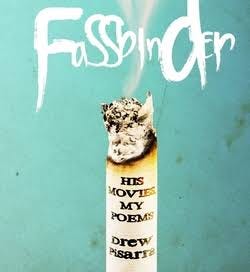Drew Pisarra’s Fassbinder: His Movies, My Poems is a riveting collection that stands as both an homage to and a reinvention of the work of German filmmaker Rainer Werner Fassbinder. Through his sharp, evocative poetry, Pisarra bridges the gap between cinema and literature, transforming Fassbinder’s bold, often provocative films into a cinematic experience on the page. By intertwining visual and textual elements, Pisarra crafts a collection that invites readers into the unique worlds of Fassbinder’s films, while using the medium of poetry to bring fresh life and perspective to his work.
The collection is an exploration of the unsettling, the provocative, and the intensely personal. Pisarra does not merely recount the plots of Fassbinder’s films; rather, he takes the emotional core of each story and translates it into lyrical verse. For Pisarra, Fassbinder’s movies are more than just narratives—they are vehicles for exploring complex themes of identity, sexuality, power, and alienation. Through this lens, Fassbinder: His Movies, My Poems becomes not just a re-imagining of Fassbinder's films but a deeper meditation on the themes that underpinned them.
Each poem in the collection serves as a transformation of Fassbinder’s cinematic world into something more intimate and visceral. For example, the poem inspired by Love Is Colder Than Death (1969) is a gritty, reflective exploration of the emotional isolation and vulnerability at the heart of the film. Likewise, the poem drawn from Ali: Fear Eats the Soul (1974) captures the tension between societal prejudice and personal connection, transforming the film’s complex themes into concise, potent lines. These poems distill the emotional intensity of Fassbinder’s films into evocative language, allowing readers to access the emotional landscape of the films in a new, visceral way.
One of the remarkable aspects of Pisarra's collection is how he frames each poem with the same cinematic precision that Fassbinder employed in his filmmaking. As Julie Poole of Bright Specimen writes, Pisarra’s poems are like frames captured by a cinematographer, with each stanza delivering a punch, evocative and charged with the energy of a carefully constructed shot. Pisarra’s ability to "light a match with his teeth" is on full display as he transforms films like The Bitter Tears of Petra von Kant (1972) and Fox and His Friends (1975) into compressed, emotional narratives that crackle with intensity. He captures the despair, desire, and defiance of Fassbinder’s characters with language that is equally raw and precise.
The collection’s brilliance also lies in its ability to weave together the language of film with the art of poetry. Just as Fassbinder used framing, lighting, and movement to convey the psychological states of his characters, Pisarra uses poetic form and structure to evoke emotional tension and narrative complexity. In Gods of the Plague (1970) and The Merchant of Four Seasons (1972), Pisarra mirrors the fragmentation and intensity of Fassbinder’s storytelling by breaking his lines into sharp, jarring fragments that mimic the disjointed nature of human experience.
Pisarra’s collection doesn’t shy away from the complexities of Fassbinder’s work. His poems wrestle with the challenging themes of Fassbinder’s films—sexuality, marginalization, alienation—and turn them into powerful, poignant moments of poetic revelation. In poems like Why Does Herr R. Run Amok? (1970) and Martha (1974), Pisarra taps into the sense of psychological tension and disintegration that permeates Fassbinder’s characters. These poems delve into the mindsets of individuals on the brink, whose unraveling is as poignant as it is inevitable.
Fassbinder: His Movies, My Poems is more than a tribute; it is an act of transformation. Pisarra takes the essence of Fassbinder’s world and reshapes it into something uniquely his own, a poetic language that reverberates with the same urgency, rawness, and passion that defined the films themselves. Each poem acts as a portal, taking readers into the heart of Fassbinder’s complex characters and their world. For fans of Fassbinder and lovers of poetry alike, Pisarra’s collection is an unforgettable journey through a landscape of cinematic brilliance and poetic insight.
In conclusion, Drew Pisarra’s Fassbinder: His Movies, My Poems is a brilliant, inventive collection that not only pays homage to Rainer Werner Fassbinder’s films but also reinterprets them in a fresh, poetic light. With cinematic precision and emotional depth, Pisarra captures the essence of Fassbinder’s work, translating it into verses that explore the complexities of human nature, identity, and desire. Whether or not you are familiar with Fassbinder’s films, this collection is an evocative and poignant exploration of the themes that continue to resonate in his work.
Buy here.



